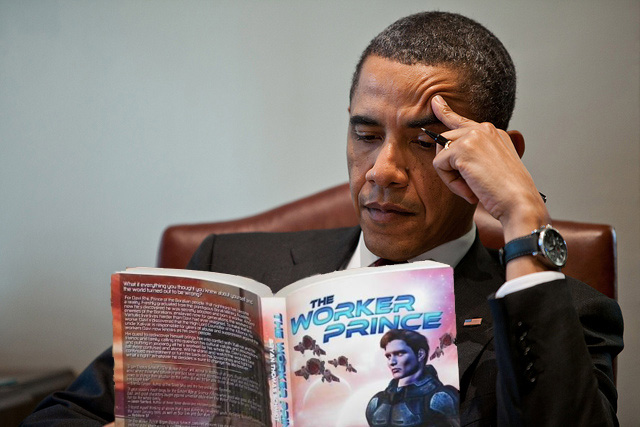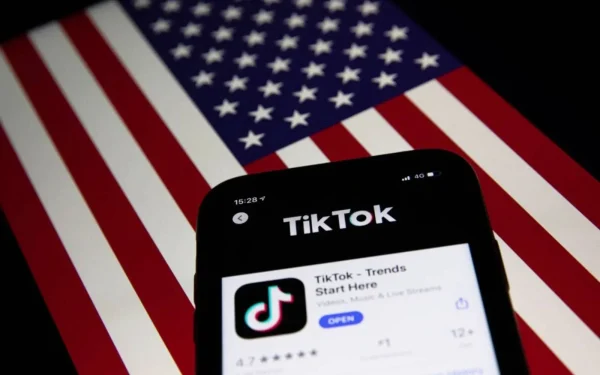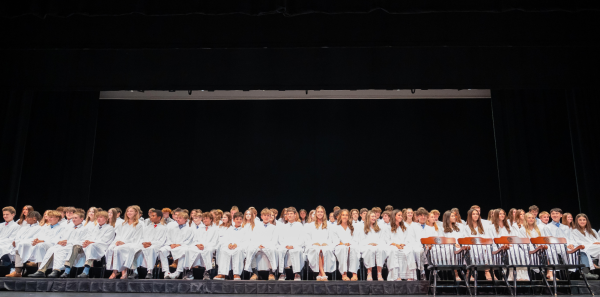Closing the Book on President Obama’s Presidency
Photo courtesy of www.flavorwire.com
Former President Obama takes some time to read the outer space tale “The Worker Prince” by Bryan Thomas Schmidt.
On January 10, former President Barack Obama gave his farewell speech at McCormick Place in Chicago, Illinois. More than 24 million Americans tuned in to watch his nearly hour-long address. There were also thousands of brave souls lining up in single-digit temperatures to get tickets to witness his farewell. Obama’s speech was intended not just to say goodbye, but to address the strengths and weaknesses of his presidency and what we all need to do going forward. As CNN described his speech, Obama admitted “candidly that political discourse has soured under his watch” and “that Americans [must] renew efforts at reconciliation.” The purpose of his speech was also to help heal angry political arguments between people and about reemerging racism in the country.
In order to further this goal of healing the racial divide in the country, Obama quoted Atticus Finch, from Harper Lee’s novel To Kill a Mockingbird. He did this to make his point about racism. In the novel, Finch is an attorney who must, in 1930s Alabama, defend a black man named Tom Robinson who is falsely accused of rape. Finch helps characters in the novel change their minds about ideas they have about African-Americans by telling them that they must strive to understand others with whom they do not agree so that they might empathize with them.
Specifically, Obama said , “If our democracy is to work in this increasingly diverse nation, each one of us must try to heed the advice of one of the great characters in American fiction, Atticus Finch.” Obama went on to further allude to Finch’s advice to “ climb into [people’s] skin and walk around in it” in order to understand them and not be biased against them.
Recently, the seventh graders at The Benjamin School read To Kill a Mockingbird, so when the famous Atticus Finch was mentioned in Obama’s speech, it caught the eye of Benjamin’s middle school Mockingbird fans of the novel as well as fans around the world.
But there was more to Obama’s mention of Finch than just a simple call to understand and to love others with whom we might not agree. As Mockingbird fans know, a rough draft of Lee’s novel was found and published in July of 2015. This version of the novel was titled Go Set a Watchman, and it portrays Finch as an older man who, while he might fight a court case for the equality of a black man, still harbored some essentially racist views. During the seventh grade study of Mockingbird earlier this year, the seventh grade decided to set up conferences about topics related to To Kill a Mockingbird, one of which was about Go Set a Watchman, so they were very familiar with the two versions of Finch as well. When fans of Mockingbird first read Watchman, they were devastated by this alternative view of their hero, Atticus Finch. But, the magazine The Atlantic suggested that President Obama, who is very well read, was probably familiar with both versions of Finch and wished to allude to both of them when making his speech. Spencer Kornhaber, who wrote the article for The Atlantic, said that Obama, in referencing both the inclusive Finch of Mockingbird and the bigoted Finch of Watchman, was appealing to people who have been racist to step into the shoes of those they marginalize. Conversely, Kornhaber felt the former president was asking people who have been victims of racism and bigotry to step into the shoes of those who have hurt them. In doing so, perhaps there could be some healing between them.
President Obama’s farewell speech does not only relate to The Benjamin Middle School because of its reference to Atticus Finch and To Kill a Mockingbird, but also because the speech highlights Obama’s love of reading and the fact that Benjamin is committed to teaching students to love reading. According to a January 2017 New York Times article, Obama’s secret to surviving the White House years was, believe it or not, books. The job of the President of the United States is very difficult and requires lots of time and dedication to his or her work, but sometimes that can be very isolating from the outside world. Obama explained that one reason he read political biographies like Team of Rivals:The Political Genius of Abraham Lincoln by Doris Kearns Goodwin during his presidency was to have someone to which to relate. In the history of our nation, there have only been 43 other presidents, with only four of them still living, and even a world leader needs someone to talk to. “So sometimes,” Obama explained, “you have to sort of hop across history to find folks [like Lincoln to talk to] who have been similarly feeling isolated, and that’s been useful.”
Obama is much like President Lincoln in that they both resorted to books as a means of dealing with the presidency. Some of the great novels on Obama’s list are The Golden Notebook, One Hundred Years of Solitude, The Underground Railroad, Gilead, Gone Girl, The Tempest, Song of Solomon, This is How You Lose Her, and The Namesake.
The Neersyde decided to ask its teacher population what they thought of Obama’s reading list and if they had read selections from his list. “I recently completed Colson Whitehead’s book, The Underground Railroad, and truly enjoyed his realistic and, yet, compassionate treatment of slavery,” said English Department Chair Mrs. Kathleen Devine. “As for Diaz [author of This is How You Lose Her] and Jhumpa Lahiri [author of The Namesake], their books are some of my favorite vacation reads. Both authors’ styles lend themselves to quick reading while delivering timely themes and multi-layered characters.”
Eighth grade history teacher Mrs. Anne Franzen also enjoyed books on Obama’s list, some even overlapping with Mrs. Devine’s choices: “I also love Jhumpa Lahiri’s books. I have had the privilege of meeting Lahiri several times before she became a known author.” Franzen went on to say, “I have also read both of Mr. Obama’s books, Mr. Trump’s Art of the Deal, and Mrs. Clinton’s Living History, and I do enjoy presidential biographies, although who doesn’t?” Both of these book lovers, and many more across the country, have read some of the books from this list and are planning on reading more in the future.
It is incredibly important for a President to model literacy and a love of reading because his example will inspire the citizens he leads right down to us at The Benjamin Middle School. Making students aware that our former president, with all of his responsibilities, has a reading list of his own and finds time to read forces us to realize that we can squeeze in twenty minutes a day in RAAP to read as well. Whether you agree with his political views or not, we can all concur that President Obama is a very accomplished, learned man, and if we wish to achieve at that same level, reading for pleasure is essential. As Devine said, “I applaud President Obama on his being a lifelong reader and on his inspiring all of us to read. After all, if the president of the U.S. can find time to read in his day, there are no excuses for the rest of us.”





